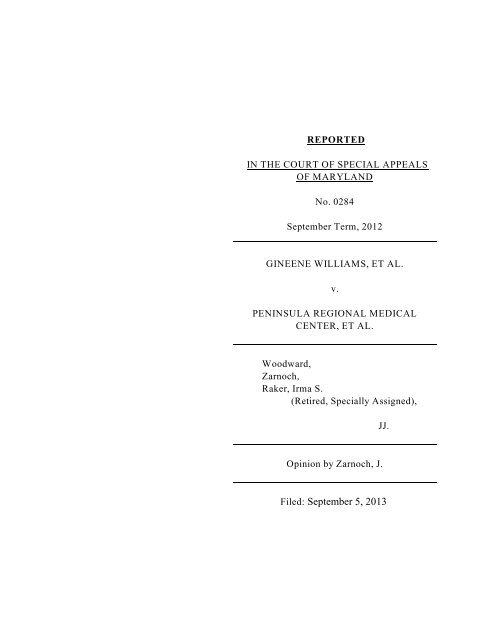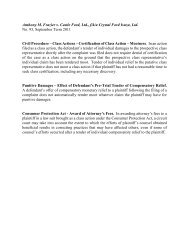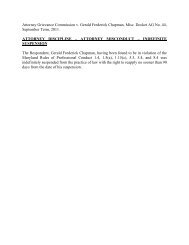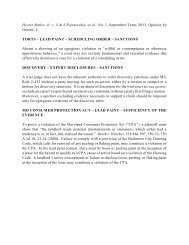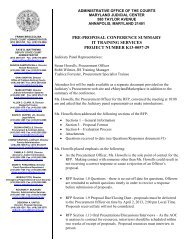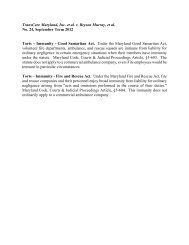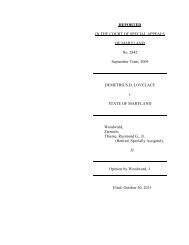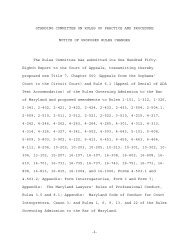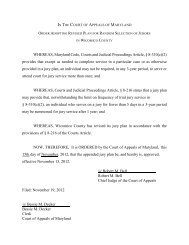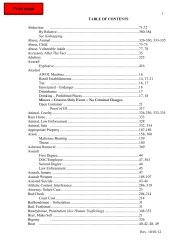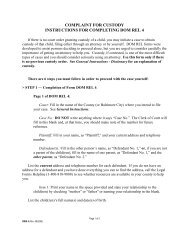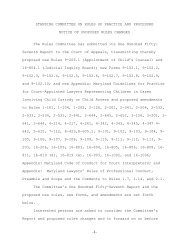0284/12 - Maryland Courts
0284/12 - Maryland Courts
0284/12 - Maryland Courts
You also want an ePaper? Increase the reach of your titles
YUMPU automatically turns print PDFs into web optimized ePapers that Google loves.
REPORTED<br />
IN THE COURT OF SPECIAL APPEALS<br />
OF MARYLAND<br />
No. <strong>0284</strong><br />
September Term, 20<strong>12</strong><br />
GINEENE WILLIAMS, ET AL.<br />
v.<br />
PENINSULA REGIONAL MEDICAL<br />
CENTER, ET AL.<br />
Woodward,<br />
Zarnoch,<br />
Raker, Irma S.<br />
(Retired, Specially Assigned),<br />
JJ.<br />
Opinion by Zarnoch, J.<br />
Filed: September 5, 2013
In this case, members of the family of Charles Williams, Jr. (Gineene Williams,<br />
Patricia Gaines, Michelle Crippen, and Charles Williams, Sr.) (collectively, “the family<br />
members”) appeal a judgment from the Circuit Court for Wicomico County in favor of<br />
appellees, Dr. Michael P. Murphy, nursing assistant George Stroop, and Peninsula Regional<br />
Medical Center (“PRMC”) (collectively, “the health care providers”). Williams was killed<br />
by police officers after breaking into a home, obtaining a knife, entering the front yard, and<br />
eventually charging at police. The health care providers’ role in this story occurred earlier<br />
in the day, when Williams’ mother brought him to PRMC because of a concern over his<br />
mental state. The health care providers evaluated Williams, he said he did not want to be<br />
admitted to the medical center, and the health care providers decided not to involuntarily<br />
admit him.<br />
The family members brought a wrongful death/survival action in the Circuit Court<br />
1<br />
for Wicomico County. They alleged that the health care providers were negligent in not<br />
admitting Williams to the medical center and that their negligence led to his death. In a twostep<br />
analysis, Judge W. Newton Jackson, III granted the health care providers’ motion to<br />
dismiss. First, the court found that under Md. Code (1982, 2009 Repl. Vol.), Health-General<br />
Article (“H-G”), § 10-618, all health care providers are immune from any liability when they<br />
act in good faith and with reasonable grounds in deciding not to involuntarily admit an<br />
Gineene Williams sued individually and as personal representative of the Estate of<br />
1<br />
Charles Williams, Jr. Gaines and Crippen sued individually and as mother and next friend<br />
of three of Williams’ children. Charles A. Williams, Sr. sued as the decedent’s father.
individual. Second, the court stated that the family members had not alleged in their<br />
complaint that the health care providers failed to act in good faith and with reasonable<br />
grounds in deciding not to admit Williams to PRMC involuntarily. The family members ask<br />
us to review whether the immunity statute applies to this case and whether their complaint<br />
failed to state a claim against the health care providers. We conclude that the immunity<br />
statute applies to health care providers who evaluate and decide not to involuntarily admit<br />
an individual. We further determine that a complaint that solely alleges negligence, such as<br />
the complaint in this case, is insufficient to overcome the immunity. We therefore affirm the<br />
circuit court’s dismissal.<br />
FACTS AND LEGAL PROCEEDINGS<br />
Although the parties disagree sharply on the legal issues in this case, there is no<br />
dispute about the facts. On April 20, 2009, Williams’ mother brought him to PRMC because<br />
she was concerned about his mental state. She was troubled by Williams’ suicidal thoughts,<br />
his auditory and visual hallucinations, his belief that he was under a curse, his obsessive<br />
behavior, headaches, trouble sleeping, and generally unusual behavior.<br />
At PRMC, Williams was examined and evaluated by, at least, Dr. Murphy and<br />
2<br />
Stroop. During these exams, Williams was alert, verbal, and cooperative in discussing his<br />
symptoms. He admitted that he was having auditory and visual hallucinations and suicidal<br />
2<br />
The family members note in their brief that other members of PRMC performed<br />
psychological evaluations, but they did not name any additional individuals in their<br />
complaint.<br />
2
thoughts. He told the health care providers that he was communicating with “the Lord,” that<br />
his ex-girlfriend had placed a curse on him, and that he suffered blindness when he looked<br />
at a text message sent from her while in the emergency room. The health care providers<br />
learned that Williams had cuts on the inside of his arms. Williams refused to discuss the<br />
possibility of inpatient care. The health care providers noted that he “appear[ed] to be<br />
minimizing any problems going on with him.”<br />
After evaluating Williams, the health care providers decided not to involuntarily<br />
admit Williams. He was diagnosed with insomnia, fatigue, and bizarre behavior. He was<br />
prescribed Ambien and his mother was advised to remove the firearms from the residence,<br />
follow up with Lower Shore Clinic the next day, and return to the hospital if the symptoms<br />
became worse. Williams was also told to “return here immediately if you feel you are going<br />
to harm yourself or anyone else.”<br />
After leaving PRMC, Williams left his mother and went to a restaurant with his<br />
children and their mother, Michelle Crippen. Williams’ mother filled his prescription and<br />
took it to the restaurant. Williams left the restaurant with Crippen but, at some point, he<br />
asked her to pull the vehicle to the side of the road. He jumped out. Members of the police<br />
department saw him in Salisbury later in the day and noted that he was acting strange. At the<br />
time, he was not engaging in any activity that would have caused the police to detain him.<br />
But shortly before midnight he broke into a house. The resident saw him and called 9-1-1.<br />
When the police arrived, Williams was in the front yard wielding a knife. He said to the<br />
3
officers: “shoot me, fucking shoot me, somebody’s going to die tonight.” He held the knife<br />
to his throat and said: “I want you to shoot me, I want to die.” The officers told Williams to<br />
drop the knife and surrender himself. He refused and charged at the officers. The officers<br />
shot Williams, but he persisted in his attack. The officers shot Williams 15 times and he died<br />
from the gunshot wounds.<br />
Williams’ family members initially brought a claim in the Health Care Alternative<br />
Dispute Resolution Office. They filed a statement of claim, a certificate of merit of a<br />
qualified expert, and two medical reports from two separate physicians. When this did not<br />
resolve the claim, the family members filed a complaint in the circuit court against the health<br />
care providers alleging negligence. PRMC and Stroop filed a motion to dismiss, which Dr.<br />
Murphy joined. The health care providers contended that H-G § 10-618 in conjunction with<br />
Md. Code (1974, 2006 Repl. Vol.), <strong>Courts</strong> and Judicial Proceedings Article (“CJP”), § 5-<br />
623(c)-(d) gave them immunity, and in the alternative, Williams’ death was so remote in<br />
time and place so as not to be reasonably foreseeable as a matter of law. The circuit court<br />
granted the motion to dismiss, finding that the immunity statute applied to the health care<br />
providers’ actions and that the family members had not alleged any facts to overcome the<br />
immunity. The family members timely appealed.<br />
The rationale behind the court’s decision and the contents of the family members’<br />
complaint will be discussed below as they relate to each question presented.<br />
4
QUESTIONS PRESENTED<br />
The family members present two questions for review, which we have reworded to<br />
properly capture the issues: 3<br />
1. Was the circuit court correct in interpreting <strong>Maryland</strong>’s<br />
involuntary admission immunity statute, H-G §10-618,<br />
to apply to health care providers who evaluate an<br />
individual and decide to discharge the patient from<br />
psychiatric care?<br />
2. Was the circuit court correct in finding the family<br />
members’ complaint failed to allege facts that would<br />
overcome <strong>Maryland</strong>’s involuntary admission immunity<br />
statute?<br />
For reasons more fully explained below, we answer these questions in the health care<br />
4<br />
providers’ favor and uphold the decision below.<br />
3<br />
The family members framed the questions presented in the following fashion:<br />
1. The Circuit Court interpreted a <strong>Maryland</strong> statute which<br />
provides immunity to health care providers who<br />
involuntarily commit persons to also apply to health care<br />
providers who negligently treat patients presenting with<br />
psychiatric symptoms. Was the Circuit Court correct?<br />
2. Was the Circuit Court legally correct in dismissing a<br />
medical malpractice action which was supported by a<br />
certificate of merit and medical report from two Boardcertified<br />
physicians?<br />
4<br />
The health care providers separately ask us to review the court’s failure to find that<br />
they were not the proximate cause of Williams’ death. In light of our affirmance of the<br />
dismissal, we need not address this issue.<br />
5
STANDARD OF REVIEW<br />
This Court reviews the grant of a motion to dismiss for failure to state a claim for<br />
which relief can be granted under a de novo standard. Clark v. Prince George’s Cnty., 211<br />
Md. App. 548, 557 (2013). “In reviewing the grant of a motion to dismiss, we must<br />
determine whether the complaint, on its face, discloses a legally sufficient cause of action.<br />
An appellate court should presume the truth of all well-pleaded facts in the complaint, along<br />
with any reasonable inferences derived therefrom.” Id. (Citations and internal quotation<br />
marks omitted). Dismissal of the action is only warranted “if the allegations and permissible<br />
inferences, if true, would not afford relief to the plaintiff.” Gomez v. Jackson, 198 Md. App.<br />
87, 93 (2011) (Citations omitted).<br />
This appeal also requires us to construe a <strong>Maryland</strong> statute. We interpret <strong>Maryland</strong><br />
statutes without giving any deference to the circuit court’s interpretation. See Davis v. Slater,<br />
383 Md. 599, 604 (2004).<br />
DISCUSSION<br />
I. Interpretation of the Immunity Statute<br />
At the outset, we are called upon to determine whether H-G § 10-618 controls the<br />
outcome of this case. The parties disagree on whether the statute applies to the health care<br />
providers’ actions in deciding not to involuntarily admit Williams to PRMC. Thus, we<br />
embark on a journey of statutory construction. We have noted that many issues of statutory<br />
construction are resolvable on the basis of judicial consideration of three general factors: (1)<br />
6
text; (2) purpose; and (3) consequences. Town of Oxford v. Koste, 204 Md. App. 578, 585<br />
(20<strong>12</strong>), aff’d, 431 Md. 14 (2013); Goss v. Estate of Jennings, 207 Md. App. 151, 169<br />
(20<strong>12</strong>). In Goss, we said:<br />
Text is the plain language of the relevant provision, typically<br />
given its ordinary meaning, viewed in context, considered in<br />
light of the whole statute and generally evaluated for ambiguity.<br />
Legislative purpose, either apparent from the text or gathered<br />
from external sources, often informs, if not controls, our<br />
reading of the statute. An examination of interpretive<br />
consequences, either as a comparison of the results of each<br />
proffered construction or as a principle of avoidance of an<br />
absurd or unreasonable reading grounds the court’s<br />
interpretation in reality.<br />
Id. at 169-70 (Citations and internal quotation marks omitted). This is a case where the text<br />
of the relevant provision is the predominant factor.<br />
A. Text<br />
H-G §§ 10-101 et seq. is the State’s Mental Hygiene Law. Subtitle 6 of Title 10 is<br />
5<br />
divided into five “parts.” Part III, labeled “Involuntary Admissions,” includes the<br />
application procedure, the process for admission, the evaluation requirements, the limitations<br />
on admissions, and a provision granting immunity for the individuals and health care<br />
providers. See §§ 10-613–619. Section 10-618 confers the immunity:<br />
(a) A person who applies for involuntary admission of an<br />
individual shall have the immunity from liability described<br />
5<br />
In the Code Revision process, a “part” is an informal unit of statutory organization.<br />
Its headings, captions, or labels are not deemed part of the law. See Chapter 21, Laws of 1982<br />
at Section 4.<br />
7
under § 5-623(b) of the <strong>Courts</strong> and Judicial Proceedings Article.<br />
(b) A facility or Veterans’ Administration hospital that acts in<br />
compliance with the provisions of Part III of this subtitle shall<br />
have the immunity from liability described under § 5-623(c) of<br />
the <strong>Courts</strong> and Judicial Proceedings Article.<br />
(c) An agent or employee of a facility or Veterans’<br />
Administration hospital who acts in compliance with the<br />
provisions of Part III of this subtitle shall have the immunity<br />
from liability described under § 5-623(d) of the <strong>Courts</strong> and<br />
Judicial Proceedings Article.<br />
6<br />
CJP § 5-623(b)-(d) further describes this immunity:<br />
(b) A person who in good faith and with reasonable grounds<br />
applies for involuntary admission of an individual is not civilly<br />
or criminally liable for making the application under Title 10,<br />
Subtitle 6, Part III of the Health-General Article.<br />
(c) A facility or veterans’ administration hospital that, in good<br />
faith and with reasonable grounds, acts in compliance with the<br />
provisions of Title 10, Subtitle 6, Part III of the Health-General<br />
Article is not civilly or criminally liable for that action.<br />
(d) An agent or employee of a facility or veterans’<br />
administration hospital who, in good faith and with reasonable<br />
grounds, acts in compliance with the provisions of Title 10,<br />
Subtitle 6, Part III of the Health-General Article is not civilly or<br />
criminally liable for that action.<br />
All parties in this case assert that the language of § 10-618 is unambiguous in favor<br />
of their respective interpretations. The family members argue that the statute provides<br />
immunity for liability for individuals who take certain steps only when those steps lead to<br />
6<br />
A similar provision for “Emergency Evaluations” is found in H-G § 10-629.<br />
8
the involuntary admission of a person. They contend that the statute only applies to<br />
involuntary admission because Part III is labeled “involuntary admission” and the words also<br />
appear in CJP § 5-623(a) and H-G § 10-618(a). Williams was never admitted, so his family<br />
members contend that the involuntary admission statute does not apply to his situation.<br />
The circuit court disagreed and adopted the health care providers’ interpretation,<br />
concluding that the statute unambiguously applied to any evaluation for involuntary<br />
admittance, regardless of whether the health care providers decide to admit the patient or<br />
release them. In making his determination, Judge Jackson reasoned:<br />
The Health-General Article contains over 20 Titles, one of<br />
which is Title 10 entitled “Mental Hygiene Law.” Title 10 has<br />
14 Subtitles, one of which is Subtitle 6 entitled “Admission<br />
Provisions.” Part III thereof concerns itself with “Involuntary<br />
Admissions.” Section § 10-618 . . . is found in Part III.<br />
Another statute found in Part III is H-G § 10-617, which is<br />
entitled “Admission Limitations.” Subsection (a) reads:<br />
(a) In general. - - A facility or Veterans’ Administration hospital<br />
may not admit the individual under Part III of this subtitle<br />
unless:<br />
(1) The individual has a mental disorder;<br />
(2) The individual needs inpatient care or treatment;<br />
(3) The individual presents a danger to the life or safety of the<br />
individual or of others;<br />
(4) The individual is unable or unwilling to be admitted<br />
voluntarily; and<br />
(5) There is no available, less restrictive form of intervention<br />
that is consistent with the welfare and safety of the individual.<br />
The “exemption from liability” statute found at H-G § 10-618<br />
does not limit itself to situations where a patient is involuntarily<br />
admitted. In this judge’s opinion, it covers all aspects of the<br />
9
involuntary admission process, including when the facility<br />
deems it inappropriate to admit someone involuntarily. Both<br />
subsections (b) and (c) posit immunity on “compliance with the<br />
provisions of Part III of this subtitle.” As stated previously[,]<br />
Part III includes H-G § 10-617 which sets forth the necessary<br />
factors for involuntary admission. Therefore, a health care<br />
provider acts in compliance with Part III when a good faith<br />
evaluation leads to commitment, but it also acts in compliance<br />
with Part III when the conclusion of a good faith evaluation is<br />
that a less restrictive form of intervention than commitment is<br />
warranted. In either case, Health Gen. 10-618 provides the<br />
hospital and its agents with immunity from suit.<br />
The circuit court’s interpretation of this statute is sound. The title “involuntary<br />
admission” can include an evaluation for such admission. The statute provides that a facility<br />
or a veterans’ administration hospital and their agents and employees are not civilly or<br />
criminally liable for any action taken in good faith and with reasonable grounds in<br />
compliance with the provisions of Title 10, Subtitle 6, Part III of the Health-General Article.<br />
See CJP § 5-623. The limitations on involuntary admission, H-G § 10-617, is one provision<br />
under Part III. Thus, as the court explained, admitting someone who meets the described<br />
criteria in H-G § 10-617 would be acting in compliance with Part III. In turn, deciding not<br />
to admit someone who did not meet the criteria would also be acting in compliance with Part<br />
III.<br />
Additionally, the very same exception from liability appears in Part IV of Title 10,<br />
captioned, “Emergency Evaluations.” This immunity provision, H-G § 10-629, was added<br />
to the law at the same time as H-G § 10-618. Chapter 459, Laws of 1982. The short title of<br />
the legislation reads: “Involuntary Admissions and Emergency Evaluations – Liability.” In<br />
10
light of this fact and that “evaluation” provisions are included in Part III’s “compliance”<br />
requirements, it seems extremely unlikely that the General Assembly did not intend to<br />
protect both emergency evaluation decisions and involuntary admission<br />
decisions—including negative ones.<br />
The family members’ emphasis on the label/caption of Part III fails for two reasons.<br />
First, this heading is not part of the law. See n.5, supra. Second, captions do not control the<br />
plain meaning of the text. See State v. Holton, 193 Md. App. 322, 365 (2010), aff’d, 420<br />
Md. 530 (2011). Their contention that H-G § 10-618 itself limits the immunity to admitting<br />
misreads the provision. The “involuntary admission” language in § 10-618 applies only to<br />
applicants not institutions or providers covered by § 10-618(b)-(c). The latter immunity more<br />
broadly applies to all acts encompassed within Part III.<br />
Reading the statute as a whole and viewing the immunity statute within the context<br />
of the statutory scheme to which it belongs, the medical professionals would be covered<br />
under the immunity provision if they acted in good faith and with reasonable grounds when<br />
they made the decision to admit or not to admit. Thus, we conclude that the statute’s<br />
language is unambiguous and provides immunity to any health care provider who conducts<br />
an evaluation for involuntary admission, acting in good faith and with reasonable grounds,<br />
whether or not that evaluation leads to an admittance or some less restrictive care.<br />
B. Purpose/Consequences<br />
Even if we assumed that the immunity statute’s language was ambiguous and we<br />
11
turned our attention to the purpose of the statute and consequences of the family members’<br />
interpretation, our conclusion would be the same. The legislative history of the 1982<br />
enactment is not conclusive on whether the General Assembly envisioned the statute to<br />
apply to anyone who engaged in the process of evaluating an individual for involuntary<br />
7<br />
admission or only someone who decided to involuntarily admit an individual. Nevertheless,<br />
there are other relevant indications of legislative purpose.<br />
Statutory provisions regulating involuntary admission to mental facilities are put in<br />
place to protect citizens from unnecessary commitment. “[C]ivil commitment for any<br />
purpose constitutes a significant deprivation of liberty that requires due process protection.”<br />
Anderson v. Dep’t of Health and Mental Hygiene, 310 Md. 217, 228 (1987) (Citation and<br />
7<br />
Statutes dealing with admission into a mental facility were formerly part of Article<br />
59. The section on immunity only dealt with immunity for a person who applies for<br />
involuntary admission of an individual. As part of code revision, this section was transferred<br />
to the Health General Article when the General Assembly enacted H-G § 10-618 in 1982.<br />
The addition of immunity for the facilities and its employees was added at that time and there<br />
have been no material changes to the language since then. The only change was to move “in<br />
good faith with reasonable grounds” and “is not civilly or criminal liable” to CJP § 5-623 and<br />
then to simply make reference in H-G § 10-618 that the immunity was described under the<br />
CJP section.<br />
Williams’ family members argue that the purpose described in the title of the bill that<br />
enacted H-G § 10-618 specifically limits the health care providers immunity to situations<br />
where an individual is involuntarily admitted. The purpose clause of the title reads: “For the<br />
purpose of protecting certain individuals and institutions from civil or criminal liability under<br />
certain conditions relating to involuntary admissions, emergency evaluations, and emergency<br />
involuntary admissions, and making structural changes.” Md. House Bill 1709, 1982 Md.<br />
Laws 3021. This Court does not read a limitation from the purpose clause. In fact, “certain<br />
conditions relating to involuntary admissions” very likely includes any evaluation for<br />
involuntary admission even when admission is not recommended.<br />
<strong>12</strong>
internal quotation marks omitted). Thus, procedures for admittance help ensure that steps<br />
are taken to only admit an individual who is truly suffering from a mental condition and is<br />
8<br />
a danger to him or herself or others before taking away the individual’s liberty.<br />
Accordingly, most provisions dealing with involuntary admission are a series of steps that<br />
must be taken before someone is involuntarily admitted. See H-G §§ 10-615–617. And even<br />
if those steps are followed and an individual is admitted, a hearing must be held shortly after<br />
to determine whether the person should be released. See H-G § 10-632.<br />
In the same year that these stringent involuntary admission procedures were passed,<br />
the General Assembly considered several bills aimed at protecting the rights of mentally ill<br />
individuals. See Senate Bill 676 (1982); House Bill 1429 (1982). In testifying for these bills,<br />
a representative of the Mental Health Association of <strong>Maryland</strong>, Inc. said:<br />
In recent years, it has become increasingly clear to mental health<br />
advocates nationwide that is essential to establish these rights<br />
legislatively. We recognize the increasing court involvement<br />
which has resulted in many landmark decisions addressing gross<br />
systemic abuses. However, we are concerned and convinced<br />
that the courts alone cannot provide the standards and<br />
mechanisms that assure good patient care and guarantee that<br />
rights are respected and protected . . . . We believe it is the<br />
responsibility of all mental health providers to assure the rights<br />
of mental patients.<br />
Testimony on SB 676 and HB 1429, March 9-10, 1982. Although a bill of rights for mentally<br />
ill individuals in facilities was not passed that year, one was passed the following year. See<br />
8<br />
Last session, legislation which would have defined this standard passed the <strong>Maryland</strong><br />
Senate. SB 1040 (2013). However, no action was taken on the measure in the House.<br />
13
H-G §§ 10-701 et seq.<br />
Understanding the deep concern for patient rights and stringent requirements for<br />
involuntary admittance, it would lead to an absurd result if we were to interpret the immunity<br />
provision to only apply when someone is actually admitted. In one breath the statute would<br />
discourage admitting individuals before a careful evaluation, but in the next breath provide<br />
immunity only when the decision is to admit. Out of fear of liability, mental health<br />
professionals might err on the side of admittance, instead of properly exercising their<br />
discretion and following the stringent requirements before taking away someone’s liberty.<br />
Two Fourth Circuit Decisions, focusing on <strong>Maryland</strong>’s involuntary commitment<br />
scheme, support this conclusion. In S.P. v. City of Takoma Park, 134 F.3d 260, 268-69 (4th<br />
Cir. 1998), the United States Court of Appeals rejected the contention that a private<br />
physician and a private hospital were state actors for purposes of civil rights liability because<br />
they were compelled to involuntarily detain and admit an individual. The appellate court<br />
said:<br />
A review of <strong>Maryland</strong>’s entire involuntary commitment<br />
statutory scheme . . . convinces us that it is permissive and<br />
leaves a great deal of discretion to the private medical provider.<br />
. . . [<strong>Maryland</strong>] does not mandate the initiation of involuntary<br />
commitment proceedings whenever the state-prescribed criteria<br />
are met. Rather, it states that such proceedings cannot be<br />
initiated absent the existence of the criteria.<br />
Id. at 270. The Court concluded “that the legislature’s intent was to protect the individual<br />
and potentially the general public, not to coerce the involuntary commitment of the<br />
14
individual.” Id. at 270 n.8.<br />
In Farewell v. Un, 902 F.2d 282 (4th Cir. 1990), the Fourth Circuit echoed these<br />
thoughts in describing the purpose of both <strong>Maryland</strong>’s and Delaware’s involuntary<br />
commitment statutes and their relationship to duty of care in a negligent failure to admit<br />
case:<br />
Id. at 289.<br />
[W]e think the limits of any such duty are implied, though not<br />
wholly defined, by the constraints imposed upon physicians by<br />
the involuntary commitment statutes. These bespeak legislative<br />
concerns, as matters of the relevant states’ public policies, in the<br />
rights of competent patients not to be subjected to paternalistic<br />
actions by their physicians, no matter how well-meaning and<br />
professionally warranted, that might intrude on their patients’<br />
dignity and privacy interests. State law, based upon a deliberate<br />
balancing of the interests at stake, compels physicians in this<br />
context to defer to their patients’ privacy and dignitary interests<br />
in ways that obviously may run counter to the physician’s<br />
professional judgment about a patient’s “best interests” and<br />
indeed may involve a known degree of risk to the patient’s<br />
well-being.<br />
Other states have reached conclusions similar to ours regarding the purpose of<br />
immunity provisions relating to involuntary admissions. In Taylor v. Herst, 537 A.2d 1163,<br />
1166 (Me. 1988), a Maine court reasoned: “Without protection from civil liability,<br />
physicians would be discouraged from examining persons for involuntary commitment,<br />
thereby making the process unworkable . . . . [I]f release decisions were exposed to the threat<br />
of liability those individuals charged with rendering those decisions would likely become<br />
unduly responsive to one consideration—the cost of liability.” (Citation and internal<br />
15
quotation marks omitted). In Ziemba v. Riverview Med. Ctr., 645 A.2d <strong>12</strong>76, <strong>12</strong>80 (N.J.<br />
Super. Ct. App. Div. 1994), a New Jersey court commented:<br />
[Involuntary] commitment is best decided by appropriate mental<br />
health care professionals, and, as such, the commitment<br />
decision is discretionary. To protect this discretionary procedure<br />
and to allow mental health care workers to perform their jobs<br />
freely, the Legislature has provided immunity from civil and<br />
criminal liability for those involved in the commitment of an<br />
individual for mental health reasons.”<br />
In our view, the purpose of the immunity statute at issue in this case is to protect the<br />
discretionary nature of the evaluation so that the medical professionals can be guided by<br />
their medical judgment and not the fear of liability. To do so, the statute must protect those<br />
who decide to involuntarily commit a patient as well as those who decide not to involuntarily<br />
commit a patient. As the circuit court pointed out in this case, “[i]t makes no sense for the<br />
legislature to grant immunity when someone is involuntarily committed but to deny it when<br />
he is not. The clear legislative intent is to allow health care providers to exercise sound<br />
medical judgment in making such decisions without being unduly influenced by the threat<br />
of litigation.” We believe this adequately captures the purpose of the immunity statute. The<br />
statute protects health care providers from any and all claims related to their decision to<br />
admit or not to admit.<br />
For these reasons, we conclude the court correctly interpreted the immunity statute<br />
to apply to the health care providers’ decision not to admit Williams’ involuntarily.<br />
16
II. Good Faith and With Reasonable Grounds<br />
A. Meaning of the Statute<br />
The family members argue that even if the immunity statute applies, the standard of<br />
acting in “good faith” and “with reasonable grounds” is functionally equivalent to the<br />
standard for negligence. Thus, they argue, because negligence is an issue for the trier of fact,<br />
so too is whether the health care providers acted with reasonable grounds. The family<br />
members contend that they submitted the opinions of two medical experts who opined that<br />
the health care providers violated the standard of care. They argue that the health care<br />
providers could not have acted with reasonable grounds if they violated the standard of care.<br />
Thus, they contend that their complaint sufficiently stated a claim against the health care<br />
providers.<br />
In addressing this argument, the circuit court stated that the family members were<br />
improperly “equating ‘good faith/reasonable grounds’ with ordinary negligence.” The court<br />
determined that this could not have been the intent of the legislature in enacting the<br />
immunity statute because it would “vitiate the concept of ‘immunity’ by adding another step<br />
in the litigation process.” This is because, the court explained, if good faith/reasonable<br />
grounds was always a jury issue, then health care providers would need to “mount a full<br />
fledged defense involving costly expert witnesses just to adjudicate” that issue.<br />
We agree with the circuit court. Under the family members’ interpretation of the<br />
immunity statute, medical professionals would not be held liable unless they acted<br />
17
negligently. This interpretation would render the statute unnecessary and truly useless,<br />
because even without the statute, medical professionals cannot be liable absent negligence.<br />
In 1982—the same year that the involuntary admittance immunity statute was<br />
passed—Governor Harry Hughes vetoed a bill seemingly providing immunity if there was<br />
no negligence. See 1982 Md. Laws 5015 (vetoes). The bill read, in part, “[a]n operator of<br />
an emergency vehicle, who is authorized to operate the emergency vehicle by its owner or<br />
lessee, is not liable in his individual capacity, when exercising reasonable care, for any<br />
damages resulting from a tortious act or omission within the scope of performing emergency<br />
service.” Id. at 5016. In explaining the reason for vetoing the bill, the governor wrote “[t]he<br />
bill as originally drafted and as amended has given rise to certain severe interpretive<br />
problems which the Attorney General believes will unnecessarily perplex both courts and<br />
litigants.” Id. at 5017. In his letter to the governor, Attorney General Stephen Sachs wrote<br />
that the bill “seems to say that an operator is not liable in tort if he exercises reasonable care.<br />
But, under such circumstances, he would not be liable in tort in any event, be it for<br />
negligence or gross negligence.” Id. at 5019.<br />
The same rationale applies to the immunity statute. The statute must provide medical<br />
professionals with more protection from liability than they had before the statute. Although<br />
the amount of protection may be open to debate, it must be at least a protection from mere<br />
18
9<br />
negligence. In turn, when health care providers are acting in accordance with the<br />
involuntary admission statute and a plaintiff files suit over their decision to admit or not to<br />
admit a patient, the plaintiff must allege something more than negligence or risk dismissal<br />
for failure to state a claim.<br />
B. The Complaint<br />
The family members fell well short of the minimum required to overcome the<br />
immunity statute. Their complaint did not allege anything other than negligence. Count I<br />
states, in relevant part:<br />
29. That the care and treatment provided by the Defendants<br />
during the April 20, 2009, hospitalization at [PRMC] was in<br />
violation of the standard of care.<br />
30. That the violations of the standard of care by the Defendants<br />
include, but are not limited to, failure to appreciate the signs and<br />
symptoms demonstrated by Mr. Williams and relationship to the<br />
potential for harm to Mr. Williams or others[;] failure to<br />
9<br />
The standard for good faith in a similar statute was discussed in Ziemba. There, a<br />
New Jersey court reasoned, upon a summary judgment motion, that the record demonstrated<br />
a prima facie showing that the defendants acted in good faith and took reasonable steps to<br />
evaluate the plaintiff. 645 A.2d at <strong>12</strong>80. The court explained that the defendant presented<br />
evidence that police officers interviewed the plaintiff, the officers took him to a medical<br />
center, an emergency room physician evaluated plaintiff, another doctor began a psychiatric<br />
screening process, a third doctor interviewed and evaluated the plaintiff, a fourth doctor<br />
conducted a similar evaluation, and then the last three doctors discussed their findings before<br />
making any decisions about involuntary admission. Id. The court further found that the<br />
plaintiff had done nothing to show these steps were not conducted properly. Id. at <strong>12</strong>81.<br />
Although this case deals with summary judgment and not a motion to dismiss, the standard<br />
for what qualifies as good faith and reasonable grounds is instructive. The court’s focus for<br />
this standard was not the details of whether the doctors should or should not have admitted<br />
the patient, but instead, the analysis was limited to whether the process was proper.<br />
19
perform appropriate tests to determine the appropriate diagnosis<br />
and treatment; failure to monitor and control Mr. Williams;<br />
failure to appreciate the seriousness of the [sic] Mr. Williams’<br />
condition; failure to ensure Mr. Williams[’] stability, mental or<br />
otherwise[,] prior to discharging Mr. Williams[;] failure to<br />
admit and/or arrange for the transfer of Mr. Williams to the<br />
appropriate facility(ies) which could have appropriately treated<br />
Mr. Williams, whether or not such an admittance and/or transfer<br />
was to be done against Mr. Williams’ will; failure to release Mr.<br />
Williams to the appropriate individuals[;] and a general failure<br />
to properly care for Mr. Williams who was exhibiting bizarre<br />
and dangerous behavior.<br />
31. That as a result in the above breaches in the standard of care<br />
Mr. Williams was permitted to leave the hospital and continue<br />
with his bizarre and reckless behavior. . . . More likely than not<br />
Mr. Williams would not have broken into the home and had the<br />
confrontation with police on the evening of April 20, 2009 if he<br />
had been properly treated by Defendants.<br />
32. That as a further direct and proximate result of the breaches<br />
in the standard of care by the Defendants set forth above, Mr.<br />
Williams was caused to be shot and ultimately killed after being<br />
discharged from [PRMC]. . . .<br />
Count II states, in relevant part: “36. That as a result of the negligence and breach of the<br />
standard of care articulated above by the Defendants, jointly and severally, the Plaintiffs .<br />
. . have suffered loss . . . .”<br />
The complaint does not even allege, let alone provide facts to support the failure of<br />
the health care providers to act in good faith and with reasonable grounds. The family<br />
members never discuss a failure in the statutory process of evaluation. Instead, their primary<br />
concern is that the evaluations of Williams were simply bad judgment. This contention<br />
focuses on whether the health care providers were negligent, not whether they acted in good<br />
20
faith and with reasonable grounds. Thus, even if the facts and allegations in the complaint<br />
were true, they would not afford relief to the family members. Under these circumstances,<br />
the circuit court was correct in granting the motion to dismiss.<br />
JUDGMENT OF THE CIRCUIT COURT<br />
FOR WICOMICO COUNTY AFFIRMED.<br />
COSTS TO BE PAID BY APPELLANTS.<br />
21


